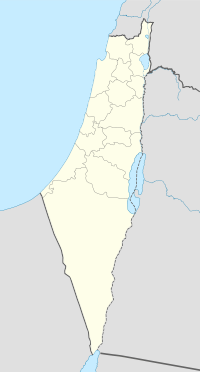Al-Hamidiyya
| Al-Hamidiyya | |
|---|---|
| Arabic | الحميديه |
| Also spelled | Hamidiya, al- |
| Subdistrict | Baysan |
| Coordinates | 32°32′39″N 35°30′56″E / 32.54417°N 35.51556°ECoordinates: 32°32′39″N 35°30′56″E / 32.54417°N 35.51556°E |
| Palestine grid | 198/216 |
| Population | 220 (1945) |
| Area | 10,902 dunams |
| Date of depopulation | 12 May 1948 |
| Cause(s) of depopulation | Influence of nearby town's fall |
Al-Hamidiyya (Arabic: الحميديه), was a Palestinian village in the District of Baysan. It was depopulated by the Israel Defense Forces during the 1947–1948 Civil War in Mandatory Palestine on May 12, 1948. It was located five kilometres north of Baysan. It was attacked as part of Operation Gideon. The population in 1922 was 193, expanding to 255 in 1948.
The village takes its name from the sultan of the Ottoman Empire, Abdul Hamid II (1876–1909).
In the 1922 census of Palestine, conducted by the Mandatory Palestine authorities, Hamidiyeh had a population of 193; 1 Roman Catholic Christian and 192 Muslims, decreasing slightly in the 1931 census to 157, all Muslims, in 42 houses.
In 1944/1945 the village was counted together with the Jewish Settlement of Hermonim, with 220 Muslim Arab inhabitants in Al-Hamidiyya, and 100 Jewish inhabitants in Hermonim. Together they had a total area of 10,902 dunums, where Arabs owned 4,720 dunums of land as compared to 1,386 (about 13%) of the total land owned by the Jewish inhabitants. Of this land, Arabs used 164 dunams for citrus and bananas, 8 for irrigation and plantation, 4,395 for cereals, while 10 dunams were built–up, Arab land.
According to Benny Morris, Kibbutzniks demanded -and often themselves carried out- the destruction of neighbouring villages for local (and selfish) reasons, as a means of blocking the return of the Arab villagers. For this reason a veteran local leader, Nahum Wurwitz of Kfar Gil'adi appealed in a letter in September 1948 for permission to destroy al-Bira, Kawkab al-Hawa, Jabbul, and al-Hamidiyya in the area for fear that they may be used by Arabs for military operations and to enable them to "take the village's lands, because the Arabs won't be able to return there".
...
Wikipedia

